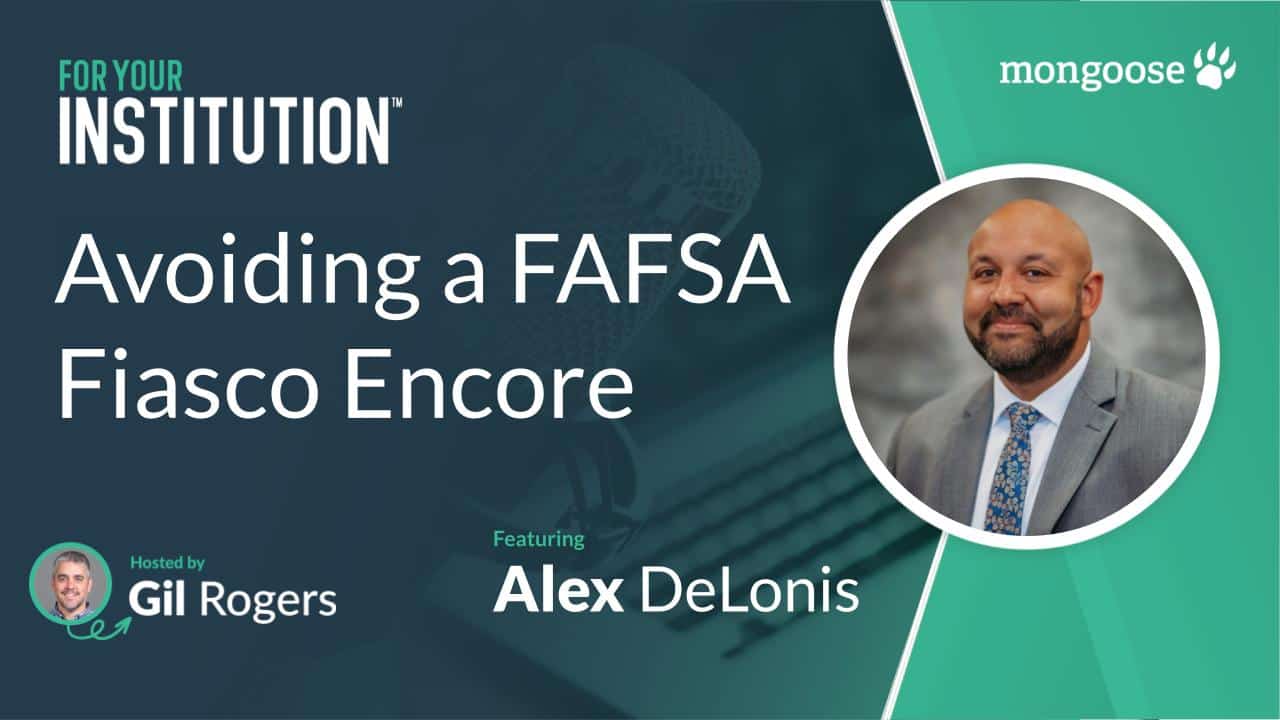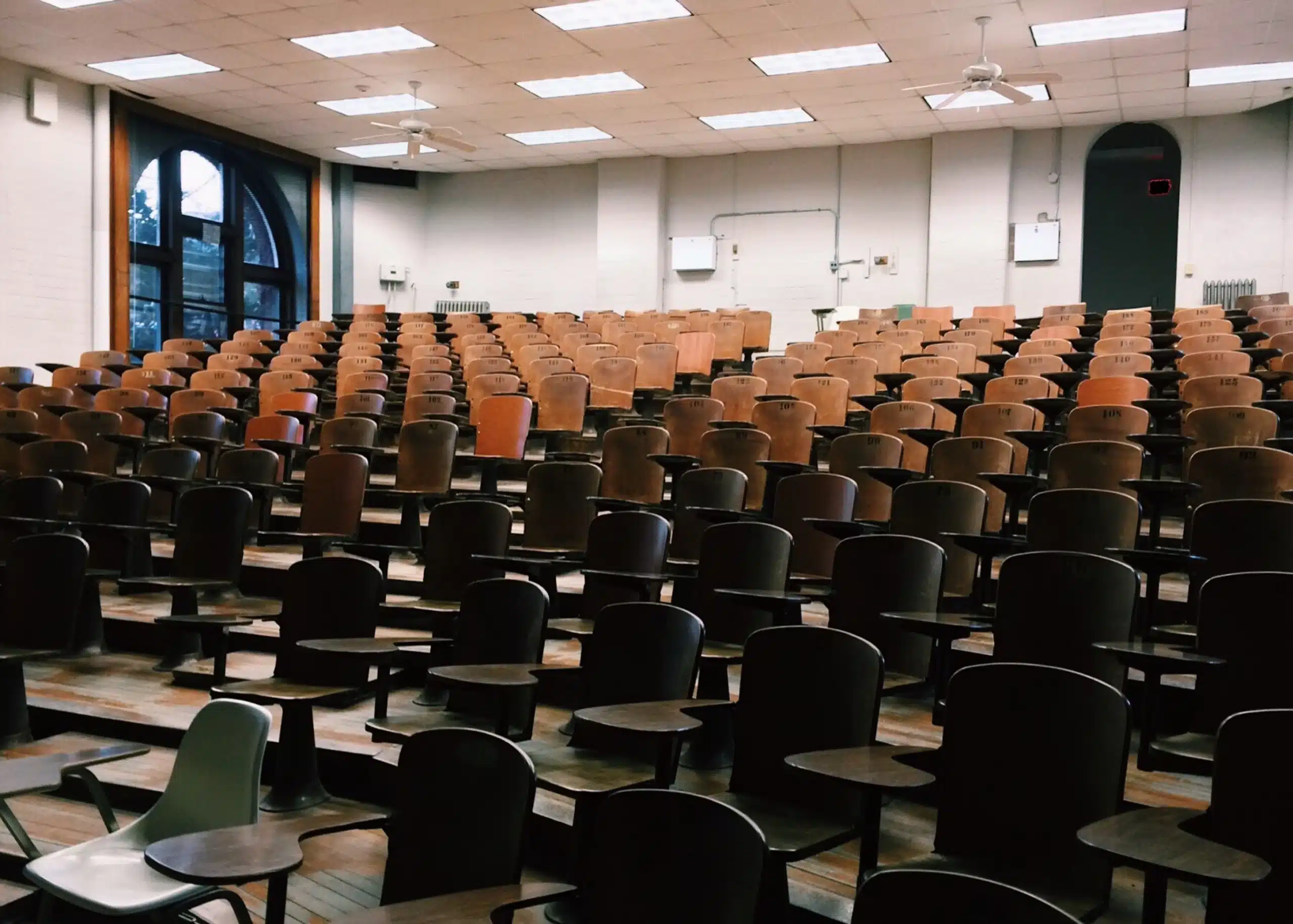Avoiding a FAFSA Fiasco: Why Your Application Might Get Rejected

This episode dives into lessons learned from the recent FAFSA Fiasco and recommendations for how institutions can be prepared in the event of repeated delays during the next recruitment cycle.
Subscribe for Updates
Don’t miss a single episode—subscribe today for the latest content!
Who is Alex DeLonis?
Alex DeLonis is an experienced enrollment management and financial aid professional, currently serving as the Assistant Vice President of Student Financial Aid Services at Saint Louis University.
In this Episode
Alex DeLonis, the Assistant Vice President of Student Financial Services at Saint Louis University, joins FYI host Gil Rogers to talk about higher ed recruitment and enrollment, and how all of that was affected by the FAFSA roll out last year. Are we heading for a repeat of last year’s problems or will it more closely resemble past years with fewer issues?
Alex and Gil talk about what happened before, and even without knowing exactly what this year will look like, what changes and preparations can be made to lessen the impact on institutions, students, their families, and admissions professionals who must adjust in real time to the situation as it develops.
Listen to this episode as Alex lays out the ways in which this year can be an improvement over last, even in the face of uncertainty, simply by being ready and flexible, and being transparent with students and families during the process.
Listen to FYI on your favorite podcast platform!
Episode Transcript
Avoiding a FAFSA Fiasco Encore with Alex DeLonis
Publishing Date: August 20, 2024
[00:00:00] Intro: Welcome back to FYI, the For Your Institution podcast presented by Mongoose. I’m your host, Gil Rogers, and today I sit down with Alex DeLonis, who is the assistant vice president for student financial services at St. Louis University in Missouri. We talk about the FAFSA fiasco and look ahead to next year, understanding that the future might not be simpler than the past.
Let’s listen in.
[00:00:33] Gil: Hey Alex, how’s it going?
[00:00:36] Alex: Oh, I am wonderful. How are you, sir?
[00:00:38] Gil: I’m doing lovely. It’s summertime. which has its pros and cons in the higher ed world, but it’s a great time of year and I’m enjoying it. so, before we hop in, love to hear from you a little bit of your role, your background, where you work, how you got there, your motivations, your Zodiac sign, anything you want to share.
[00:00:58] Alex: Yeah, absolutely. Yeah. So, I’ve been in financial aid, specifically for about 15 years now, all financial aid. Well, I did some. work in the orientation office way back when, but for the most part, it’s been all financial aid. And right now, I am the assistant vice president of student financial services at St. Louis University. only been in this role for about four months now. just packed up the family. we moved from, The Indianapolis area, and then we’re going to be moving again, in a little bit because we went from renting and we just bought a house, so lot of shuffling to go on top of, a new job, which is always fun, so, exciting times at SLU, before being in St. Louis, I spent five years at SLU. Wabash College in Crawfordsville, Indiana, also in financial aid. And then before that I was all community colleges. So, I started my education at a community college, started working at a few community colleges before, hopping into the private sector. and yeah, I started as a, because obviously I didn’t major in being a financial aid professional.
So, actually I thought criminal justice is where I want to go. It’s, like, this awkward time, in high school where they’re, like, yeah, you have to pick something now. and nothing for higher ed comes up there. I mean, unless you want to be faculty, higher ed administration No one tells you about when you’re just a 16-year-old person, trying to figure out what you want to do for the rest of your life.
So, I started as a federal work study student. my, advisor or my financial aid advisor just pulled my name off a sheet because I indicated that I was interested in federal work study. can’t do that anymore because they took that question off the FAFSA. I’m sure we’ll get into that later. But I started there and the rest is history.
I changed my major to psychology, kept it a little more general. And then right after my undergrad went right into my master’s in higher ed administration, and then, just kept it rolling from there. So, turned into a now 15-year career and loving every second of it. and, I was a first-generation college student, Pell Grant recipient.
So, it’s just something about the profession that I knew absolutely nothing about until I was 18 years old. That just, kind of, spoke to me.just being able to, be part of, I, like, to say, facilitating access to higher education, right, because it’s not my personal money, right, I’m facilitating other people’s funds to open up doors for students, that they didn’t know were there, as I didn’t know, were there, so yeah, it’s fun, it’s fulfilling, it’s something that, I only have to hit the snooze button on my alarm clock once every morning.
If you don’t have to hit the snooze button, good for you. I still have to hit it every now and then. So, yeah, so yeah, I’m excited to be here and, continue the great work SLU.
[00:04:00] Gil: Awesome. Similar origin story. I worked in work study in the purchasing department at my alma mater. And now I didn’t end up working in purchasing for my whole career. I’ve purchased a lot of things over my lifetime, but that’s
[00:04:14] Alex: tomato, tomato.
[00:04:16] Gil: But ended up being an admissions counselor, worked in undergraduate admissions for years and years.
And, like, you mentioned, nobody goes to college saying, I want to be a financial aid officer at a college, but eventually you end up in that role. I will say financial aid has been a very active topic on the podcast. This, Season, and last season, there were some things going on.
All right. And so, I’d love from your purview, how, well, how are things going for you now relative to where they were, let’s say five, six months ago.
[00:04:46] Alex: Yeah, lot more uncertainty five, six months ago. I probably had a full head of hair five, six months ago. now I’m completely bald, after all the things we went through. No, I was bald well before then. But,five, six months ago, we didn’t have aid offers out where many schools would have at that point.
So, there was still this, kind of, waiting game, as far as when we would get this ICER data, the FAFSA information to be able to send aid packages to students. we got through that through the end of April. working through now graduate students, currently enrolled students continuing to work with incoming students to ensure they are able to show up here in August, and now a lot of us are starting to think forward to the next year’s FAFSA, which sounds crazy, but it should be opening up here and, less than a few months, and I say should be with a couple asterisks around it.
So, we are looking forward to October 1st, but starting to make plans about what does that October 1st date look, like, will there be a delay in getting the actual FAFSA data to institutions again? It Sounds, like, that’s probably going to be the case. But then again, over the last few years, we’ve gotten new information from the department that has forced us to pivot, time and time again.
So, we know more now than ever, we need to be agile, We know, what the updates that we get now, like, we’ve had too many heartbreaks in the past thinking, like, oh, well, they said this, so this is exactly how it’s going to be, like, no, like, we’re almost in a, we’ll believe it when we see it phase.
So, yeah, we did some things to help prepare with giving students early estimates and creating our own forms and tools and things, like, that. So, now we’re just, kind of, do we need to carry out those things again to make sure that families have information as soon as possible.
A lot of the conversations we’re having right now.
[00:06:52] Cadence Ad: Discover future applicants, delight enrolled students, and amplify fundraising performance with our Cadence engagement platform’s live chat and chatbot solutions. Designed exclusively for higher ed by higher ed professionals, Cadence helps you engage your audiences with the perfect balance of AI and personal connection.
We leverage proactive outreach and anticipate common roadblocks. Knowing the most significant decisions often start with the smallest conversations. Our powerful AI ensures instant support and is smart enough to know exactly when to hand off to a staff member. And if nobody is available, it allows for easy follow up.
Effortlessly integrated with your website, we proudly feature an industry-leading 85 percent self-service rate. It’s never been easier to make every message count.
[00:07:44] Gil: Got it. a lot of the conversations I’ve had about FAFSA this cycle have been, unfortunately, it feels, like, a little bit of an echo of the COVID era, right, where during COVID, everyone was just being super reactive, right, because we had to be, nobody was planning on a Right.
Global pandemic to derail the recruitment cycle and the enrollment cycle. And so, there was some grace all sides because everyone was going through this together. Whereas with the FAFSA process this year, ideally, you don’t have a delay in getting the data next year, but. It sounds, like, if there are problems, now there’s some infrastructure there that’s able to address some of the issues and some of those problems, right?
And so, where I, as this cycle, you were in a little bit of a, well, we don’t know what we don’t know, and we also are waiting to get we’re waiting for at whatever mile marker at throughout this cycle. Now it seems, like, you mentioned being nimble, right? And being flexible.
So, what are some of the things you can think about as far as being prepared? let’s pretend, yeah, there are delays, right? So, what are some things you can do next year that you weren’t able to do this year? Yeah.
[00:08:53] Alex: Piece, communicating with families, a lot of the things we already have built, to be able to engage with families sooner rather than later. Also, when our admissions folks go out on the road, they know to talk. in non-definite language, right, when working with students and parents and high school counselors, to be able to, let folks know, like, this is the plan today, and we will update you if and when that changes, and then just timing, The timing of everything got pushed back so far the cycle we’re in now.
I think we can do things make sure that we’re better prepared on the timing end, to make sure, because The FAFSA is not the only thing we’re balancing, right? as aid administrators, I mean, we’re dealing with the audits, we’re dealing with other things that need our attention to.
So, just, if there are times where things are being delayed. Ensuring that maybe we’re working ahead on other things so that when it is time to push out those aid offers, we can clear everything, and just focus on, getting that task done. So, it almost felt, like, in the last cycle, and I was, kind of, at two different schools during all of the FAFSA fun.
So, I got to experience on a couple different ends there. it just seemed, like, A lot of things were happening all at one time, at some point. And people were just being stretched so thin. So, when we have times to work ahead on certain projects, even though that wouldn’t have been the way we typically did it, we need to take advantage of that, knowing that is just so uncertain.
[00:10:34] Gil: And I think this cycle had an interesting wrinkle to it where with the new FAFSA, you have students who are currently enrolled, who have, this is a new process for them. You have students coming in that this is the only process they’ve ever known, right? And now next cycle, there’s presumably going to be a third audience, which will be the audience where this is the first cycle that they’ve ever known.
But the classroom this year is going to already have experience with it being all messed up, right? And so, hopefully that group. the biggest heartache and where I have pause with, taking that lately is that the group that went through this, kind of, disjointed, we’ll call it FAFSA cycle, is the same group that was most heavily impacted with the immediate shift to remote learning during COVID, right?
And they’re all of those issues. And so, now you’ve got The social isolation issues and the challenges with dealing with stress and anxiety, and so that group now is potentially getting primed for a do over of that same issue. And so, from an access and a support perspective, right, What are some of the things that you think about and talk about with your colleagues?
Not just at SLU, but, you know, I know that the financial aid community is very open and connected and talks to each other. What are some of the things that you hear and that people are saying, like, what can we do to beyond just lather, rinse, repeat from last year? But to really ensure that we’re best supporting the students who are most impacted by these challenges, which we all know, are students who are, coming from, you know, first generation, lower income.
Plus, compounded with the fact that they’re the COVID impacted class, right, like, it’s a really hard group really painful to think about. And so, I’m sure you have some thoughts and you have some experience in dealing with and supporting students through this process,
[00:12:22] Alex: Yeah, absolutely. I mean, and you almost have to think if you’re a part of that group, like, what does the universe have against me, right, like, with the crazy timing there. but yeah, I think the institutions who have the resources, I think there’s a difference between sending out Messages and depending on families to read and comprehend that and take action to are we able to make phone calls?
Are we able to meet you where you are at, right? Meet you where you’re at on campus. in your groups, in your classes, with your athletic teams, to engage folks that way, almost in an intrusive matter, kind of, some intrusive advising there. So, the problem is when we’re thinking nationally, not every institution has the bandwidth and the resources and the staffing to make that happen.
They are dependent on writing something up, sending it out. It goes out into the universe, and whether it hits or not, that’s about all they have the bandwidth to do. there’s a lot of institutions that are short-staffed. I think the financial aid profession more Well, I won’t say more than any, but just as much as any, we’re hit with a great resignation. pretty hard. So, like, even on my team, many of our entry level positions are, folks with no financial aid experience whatsoever. and we’re, kind of, having to build everyone up at the same time there. So, yeah, you have the resources to do it, there’s definitely some higher touch things that you can do to look at some data, figure out students that are at higher risk, and try to hold their hand across the finish line, and then their school’s not in that situation, hopefully, those students can get resources within their community, from other folks who can help them out when they’re,
[00:14:17] Gil: Yeah. And you mentioned using data, the hard part for a lot of folks is they’re so used to their, models that use the same, kind of, regression analysis over the past five years or whatever it is. And so, they’re used to prioritizing students or placing them in their tables in a specific way.
Now, in this five-year cycle, you’ve got a COVID class and you’ve got a, new FAFSA class. And now next year you’ve got the second year of the new FAFSA class. So, you need to be a nimble when it comes to the use of data and there’s that balance of knowledge and experience, right?
And having that ability of, what is that? the true understanding of the difference between knowledge and wisdom, right? is the important component to this. So, as someone who’s got a lot of wisdom in working in this field for so long,what is your way to balance that effective use of data, but also just gut decision making with not complete information?
[00:15:09] Alex: Right. Yeah. And facing that more than ever right now. of the things, we just got an update, from right when we think we have it all figured out, right? we continue to get these curve balls from the department. And one of the latest things were how we resolve conflicting information, right?
They came out and said, institutions. We’re going to drastically cut the amount of students you have to verify. So, the students that we have to engage with to collect paperwork to verify their FAFSA information. And for our institution, we had, like, 50 students and we’re a mid-sized school.
That’s almost no one if you really think about it. But they then came out. and gave us new guidance on how we resolve conflicting information, which from what I’m hearing from a lot of schools could be about 10 percent of their population. So, you go from 50 students or this maybe a couple dozen students on your campus that you have to verify to get this relief they’re trying to provide.
To, now having to go out to hundreds of students, possibly, hopefully it’s not in the thousands, maybe depending on the size of the school, to now, and these students have already gotten aid packages. We’ve packaged these students, right? now, depending on how they respond, it could impact their aid.
And institutions have to decide how they want to handle that, going back to the part where if it’s a well-resourced school, they might be able to make it up. But some schools, it’s going to be what it’s going to be. If it impacts your aid, it’s going to impact your aid. So, there’s that analysis that we can do in advance to try to make these estimates.
Before students even come back with any paperwork we might require from them. but no, it’s tough and it puts us in the middle as students might feel, like, it’s the institution doing this to them, when really we’re working on behalf of the feds on that one and gathering what we have to do from a compliance standpoint. So muddy.
[00:17:14] Gil: Because for a lot of institutions that are so tuition-dependent, right, they rely on getting the appropriate data so they can aid the student to the best of their ability, but there’s going to be gaps they’re shortchanged in this process on a number of fronts and it’s not for the desire of the institution to do so.
It’s just deck that we’ve been dealt, right? And it’s. A challenging scenario for all fronts.
[00:17:37] Cadence Ad: Grow your student community, help them stay, and encourage giving with Cadence, Higher Ed’s premier engagement platform from Mongoose. Designed exclusively for Higher Ed by Higher Ed professionals, Cadence helps you engage your audiences with the perfect balance of AI and personal connection. Talk to students, parents, and alumni on their time and how they want.
Empower your staff with integrated text and chat inboxes that gather all conversations in one place. Reach out to learn more about how our best-in-class service, support, and integrations have helped colleges and universities like yours have smarter conversations. From text to chat, make every message count.
[00:18:21] Gil: Hopefully. And I know hope’s not a strategy, but hopefully this next cycle, as you mentioned earlier, you at least have the methods for communicating the methods for reaching students and, kind of, infrastructure there.
So, if there are delays again, you at least can be a little bit more nimble and proactive instead of reactive, when it comes to supporting students through this process.
[00:18:43] Alex: And you have, so what, we had the May 1 deposit deadline, some schools might have shifted theirs a little bit. institutions had probably started building their, what, probably most schools are on a July 1 fiscal to June 30. A lot of schools probably started to budget around that, and then, wow, 10 percent of your students might have an aid eligibility change. What does that look like, so, yeah, tough.
[00:19:11] Gil: And like I said, if you’re a school of means that can say, Oh, well, whatever benefits the student better, we’re going to go with that. Right. Cause they can absorb it. That’s not everybody. That’s actually the exception, not the rule.
[00:19:22] Alex: Right? Yeah, because I think in the media you, a lot of times you only hear about the elites and what the elites are doing. but there’s however many thousands of schools not in that same situation.
[00:19:34] Gil: And hopefully, it’s one of those where, kind of, it’s unfortunate. Cause, like, 10 percent of your students, maybe it all comes out in the wash where, some are higher, some are lower, et cetera. But what about that one student that’s lower, one student that’s higher, like, the individual student that’s being impacted by this, where now the level of aid they were expecting is not what it was, is not what they’re going to get.
And now, They’re left to make up the difference once they’ve already made those decisions. And that’s you could say in the aggregate, right? From an institutional health perspective, if all the numbers work out, it’s okay. But those individual students who are impacted, it’s a tragedy in a lot of respects that, the process is what’s impacting the students.
they didn’t do anything wrong, nothing. They changed. It’s now the process has changed and that’s an unfortunate situation for them.
[00:20:23] Alex: No, and that’s a great point, and we’ve gotten that so much over the last few years. Well, well, oh, this error only impacted a half a percent of students, Well, those are still people. Those are still people who are hoping to go to school this fall, that may not be able to, even if it is only a few thousand students out of millions.
I mean, are real people with families and who are trying to change the trajectory of their future. So, it’s tough when we hear things, like,
[00:20:55] Gil: Yeah, a few thousand people is still a few thousand people. It’s a lot.
[00:20:59] Alex: Yes.
[00:21:00] Gil: So, it’s hard. I mean, and again, I get from a, again, from the aggregate, from the top-level view, it’s not that big of a deal, but it is that, and it should be that big of a deal. Right. So, speaking of that, what, you obviously, you’ve been in this space for a bit.
You’ve got thoughts and experience and perspectives. What’s some advice that you give to newer folks in this profession who are, kind of, experiencing what we hope to be an anomaly of a couple of years. and the promise of this whole new FAFSA was supposed to be easier and simpler and open up more aid opportunities.
That was the promise of all this. So, let’s pie in the sky. Let’s assume we get to that level in the next year or two. For folks who are new to the space, what’s some advice for them to stay engaged, stay involved? And to the good work.
[00:21:46] Alex: Yeah, absolutely. So, I, like, to think of my favorite video game, Zelda, one of the best quotes there.
[00:21:54] Gil: Solid.
[00:21:54] Alex: He gets the master sword, he tells them, don’t go at it alone. Right? you’ve got a full community that you, kind of, referenced earlier. full community that is here to support you, through the process.
We’ve had so much in financial aid with the delayed FAFSA and then with COVID, which were probably two once in a career experiences back-to-back, right? And for those who we’re, kind of, siloed, I couldn’t imagine, of how they made it through, both of those things without the sense of community, without being able to pick up the phone, and call, a counterpart at a different institution, or be within an association have a monthly call with people from your area or, like, institutions, things, like, that, or just people just to complain about it, right? who are going through the same exact thing you’re going through, who can relate to the things that are flipping your world upside down.
So, for me, that makes all the difference, all the world. I mean, I have my different text groups. I have my different listservs. I have monthly meetings with certain groups to be able in honest places to go and say, like, and be vulnerable, like, Hey, I could be way out of compliance here, but I’ll throw it out there.
And the group will give me honest feedback, right? So, that’s the number one thing by far that I will say if you’re a new director or new to AID in general, is there’s only so much you can do by yourself at your institution without getting some different perspectives. and to branch out, get out there in the streets, talk to people, go to conferences, engage.
We talked about resources. Zoom calls, conference calls, text chats are relatively low-cost things. sure, if you can get to that conference, great, that’s the cherry on top. But you can do a lot of those things without actually spending money on travel. So, yeah, take advantage of all of those opportunities when you can.
[00:23:57] Gil: Awesome. And so, for people who want to take advantage of the opportunity of picking your brain, staying in touch, learning a little bit, lamenting a little bit, what are the best ways to get in touch with you?
[00:24:07] Alex: Yeah, so, LinkedIn. LinkedIn will definitely be the best way to engage with me. I’m pretty active there. So, yeah, feel free to connect with me, follow me, send me a message, you know, would be happy to engage with folks there.
[00:24:24] Gil: Awesome. And for our podcast listeners, we’ll put a direct link to your LinkedIn in the episode notes. So, we’ll make it easy for you. So, Alex. I appreciate you taking the time today. and I know this is a crazy topic and hopefully a year from now, we’re not having a repeat episode of this. maybe we’ll get together a year from now and have a reflections podcast and we’ll everything positive and happy and, the promise of the simplified FAFSA will have come to fruition.
Doesn’t feel that way quite yet, but we’re heading in that direction. So,
[00:24:53] Alex: Yeah. Just that conversation. You remember how messed up that FAFSA used to be and how amazing it is now, like, I cannot wait to have that conversation with you.
[00:25:02] Gil: I think we’re waiting a long time to having a conversation about how amazing the FAFSA is. we’ll get there. So, awesome. Alex, thanks. Thanks so much again for the time and to our listeners. Thank you for being a part of the conversation. We will see you all next time on FYI. Bye.
[00:25:22] Cadence Ad: Thoughtfully nurture applicants, personalize retention efforts, and exceed fundraising goals with our Cadence Engagement Platform’s text messaging solutions. Designed exclusively for higher ed by higher ed professionals, Cadence helps you engage your audiences with the perfect balance of AI and personal connection.
We leverage an intuitively designed interface and easy to use texting templates so you can have targeted conversations or scale up to expand your reach. Our powerful smart messaging can respond automatically, exactly how you would. And to measure progress, track your campaigns with unparalleled reports and analytics.
Effectively meet your community where they are as we proudly feature an industry-leading 95% read rate within three minutes. It’s never been easier to make every message count.



